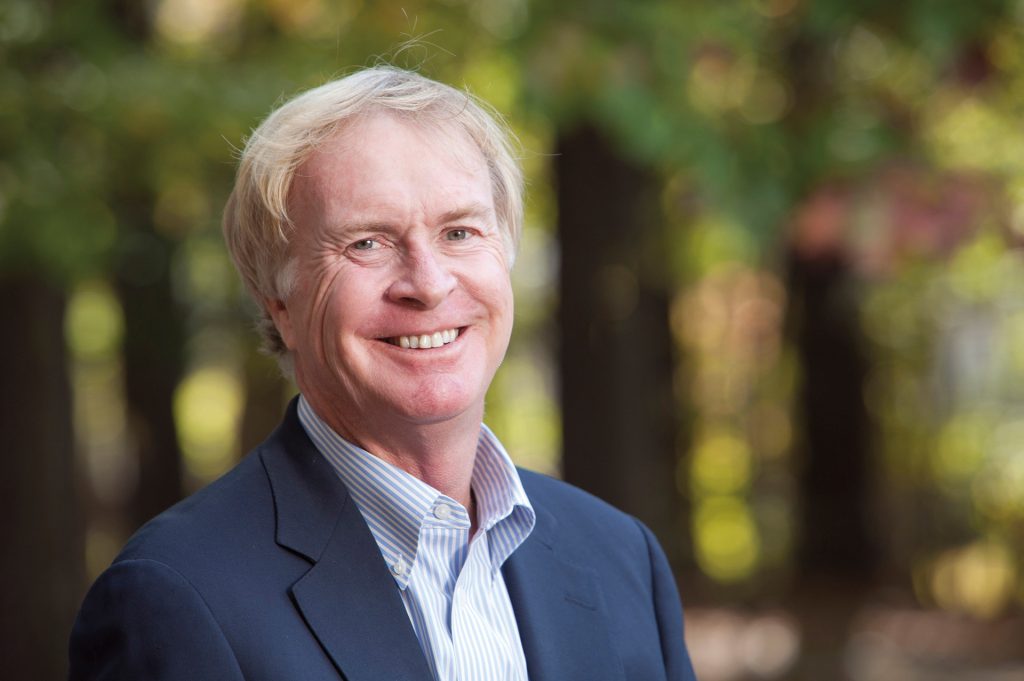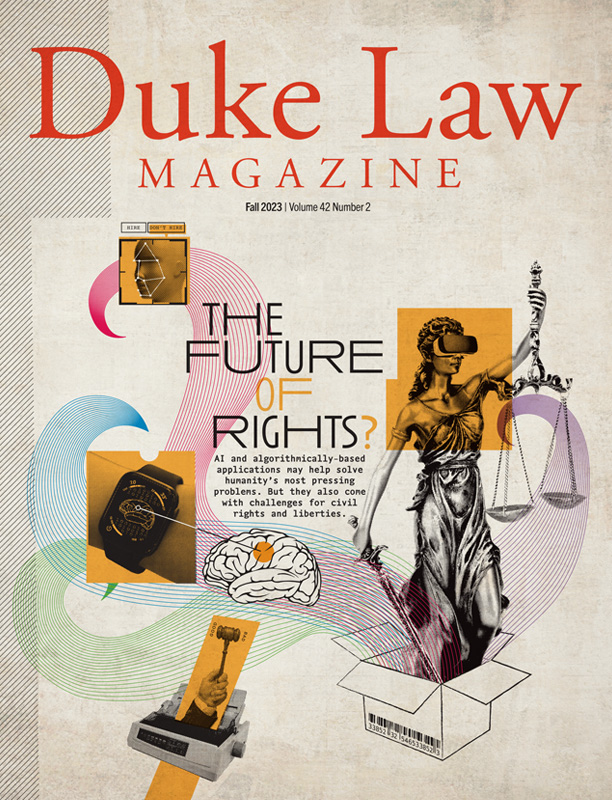
Daniel S. Bowling III ’80
Former Coca-Cola executive Bowling ’80 retires from teaching at Duke Law
Distinguished Fellow Daniel S. Bowling III ’80, a longtime senior executive for one of the world’s most iconic brands, retired from 18 years of teaching at Duke Law School in the spring.
The former head of human resources for Coca-Cola Enterprises, Bowling applied his corporate background and study of positive psychology to courses in labor and employment law, which he began teaching in 2005, and a popular seminar on lawyer well-being.
Bowling’s upbeat personality and genuine interest in students made him a confidant to those looking for advice on managing the demands of law school. In 2015 he received the student-voted Distinguished Teaching Award, which he called “the great honor of my career.”
“What I love most about teaching is getting to know the students and being in the classroom with them, exploring and laughing,” Bowling says. “People learn a lot better, I’ve found, when they’re relaxed and open and when a teacher uses emotional intelligence, not just pure logic.”
Born in Georgia and raised in Mississippi, Bowling earned his bachelor’s degree from Millsaps College. After graduating from Duke Law, he joined Smith, Currie and Hancock in Atlanta, where he became a partner focusing on labor and employment litigation. In 1986 Bowling joined Coca-Cola Enterprises as chief labor counsel — “In Atlanta, when Coke calls you go,” he says — rising through legal and management positions to become senior vice president of human resources and a member of the corporation’s executive committee.
While at Coca-Cola, Bowling became interested in the work of Martin Seligman, a pioneer in the field of positive psychology and author of bestsellers including Learned Optimism and Authentic Happiness. Seligman’s research squared with Bowling’s own belief that companies were becoming more focused on the grievances of a few unhappy employees than fostering a positive corporate culture among the majority who were content. Happy employees, Bowling had observed, were more loyal and productive than those hired solely for their skills, and also less likely to unionize.
“I didn’t want us to recruit and hire a bunch of people who had switched jobs a lot,” Bowling said. “There was something I’d hear a lot from the old-timers: ‘I bleed Coke in my veins.’ And I still believe that was our greatest strength – the genuine love for what they did and the people they worked with and the product itself. If you love your job, you don’t care how many hours you’re spending at it.”
“We talk about meaning in class, and my belief is that you don’t find meaning; meaning finds you.”
— Dan Bowling
After leaving Coca-Cola in 2005, Bowling began consulting for corporations such as R.J. Reynolds and teaching a one-credit labor law seminar at Duke Law with former Coke colleague Gray McCalley ’79. He also enrolled in Seligman’s program at the University of Pennsylvania, earning a master’s in applied positive psychology in 2009. He has remained involved with the program as a lecturer and advisor ever since.
“[H]umans aren’t capital. We are living, breathing things of infinite variability,” Bowling wrote in his thesis Happy at Work: How the Science of Positive Psychology Will Revolutionize the Workplace. “This is what positive psychology teaches us, and why its application to the workplace has the potential to revolutionize work as we know it.
“There is an implicit understanding in America that work is not supposed to be fun, and one should look for happiness outside the confines of the office or the job site. But this is dead wrong. You cannot be happy in life without finding happiness at work. And you can be happy at work and should be happy at work.”
Father’s resilience showed the power of optimism
Bowling traces his interest in positive psychology to his father, who kept a cheerful, optimistic outlook throughout his life despite personal hardships.
“He lost both parents within one year of each other when he was 10 and he could have spiraled into a pretty miserable, troubled life but he didn’t, and I think it was through the power of optimism,” Bowling recalls. “He was diagnosed with terminal cancer when he was 70, but even then, he fought it with optimism. I think I was very much influenced by that and I was very fortunate to grow up with that as an example.
“Optimism is, to a certain extent, inherited. But we’ve learned a lot about the brain and how it works in the last 25 years, and through a series of empirical studies we’ve learned that while a pessimistic person can’t turn optimistic overnight, it can be a learned trait.”
In 2010 Bowling began teaching a second seminar, Well-Being and the Practice of Law, that he designed around data and literature on hedonics and psychological health, as well as studies on depression, substance abuse, and career dissatisfaction among lawyers and their impact on legal professionalism. Bowling encouraged students to use self-measurement tools to assess their own happiness and character traits and suggested research-based interventions they could apply to align their career choices with their strengths and enhance their well-being. The class quickly became popular, and its curriculum has become a model for programs at other law schools.
“The premise of my course is that a happier lawyer, however you find that, is a better lawyer,” Bowling says. “We focused on skills you can take with you for life and practice: resilience, how to cope, how to rebound, learning how to challenge your own catastrophic thinking.”
Bowling was surprised and pleased by students’ willingness to share their insecurities, doubts, and anxieties about the pressures of law school. The classes became especially meaningful as students coped with the uncertainty and loneliness of the pandemic, he says.
“I encouraged and talked about the importance of relationships and being open with others, sharing good and not so good experiences and being honest. There are a lot of current and former students who I know well outside the scope of the class – I know about their career ups and downs and their life struggles and successes, and that’s very important to me.”
For the past 10 years Bowling also taught a doctrinal class in labor law, a topic that has gained relevance for students with the recent emergence of organizing in industries not historically associated with unions.
“Hearing about a steelworkers’ strike or a coal miners’ strike seems distant in today’s world, but it becomes more real when Apple, Amazon, and Starbucks are having labor union issues,” Bowling says.
“Students now are beginning to graduate from colleges where they may have been taught by a union member who very well may have missed two weeks on strike.”
In 2022 Bowling co-wrote two commentaries on physician unionizing with former Katharine T. Bartlett Distinguished Professor of Law Barak Richman, now a professor at George Washington University Law School, and Stanford University School of Medicine professor Kevin Schulman. The articles led to speaking engagements before groups including the American Medical Association.
“I never would have thought I’d end up spending the later chapters of my career in an academic environment. But meaning changes as the stages of life progress, and I think I’ve found much more meaning and calling in that than I did in the other ones.”
— Dan Bowling
Researching that work whetted a greater interest in scholarship, Bowling says, and currently he is working on a project on the 19th century labor movement that may become a book. He also is teaching an expanded version of the lawyer well-being course at Georgia State University College of Law in Atlanta, his home base, though he and his wife Libby also maintain a home in Durham and enjoy strong ties with Duke University, from which two of their three children also graduated.
“We talk about meaning in class, and my belief is that you don’t find meaning; meaning finds you,” Bowling reflects. “I was an indifferent law student at Duke, to be honest, and I never would have thought I’d end up spending the later chapters of my career in an academic environment.
“But meaning changes as the stages of life progress, and I think I’ve found much more meaning and calling in that than I did in the other ones.” — Jeannie Naujeck

